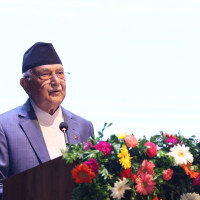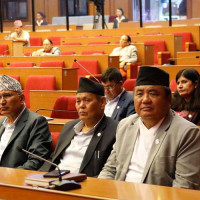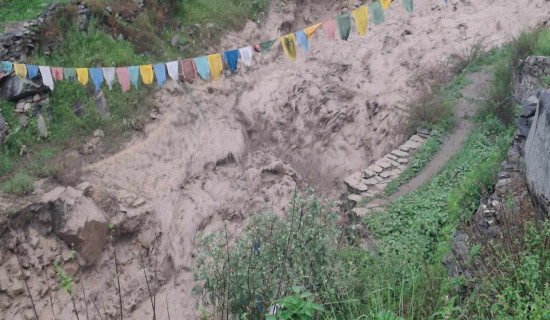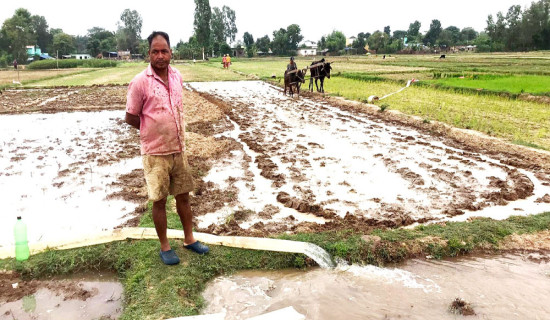- Thursday, 31 July 2025
Parliament has long way to go in regard to efficient business
By Pallav Bhusal, Kathmandu, July 6: As Nepal’s Federal Parliament is halfway through its budget session, the atmosphere in the chambers is a mix of progress and conflict. While several crucial bills have been passed, most notably the Appropriation Bill and the long-awaited Federal Civil Service Bill from the Lower House, tensions continue to rise over controversies linked to the visit visa and cooling- off period, alleged weakening of parliamentary processes, and disagreements over the people-centric nature of the budget.
The halls of the House of Representatives have lately resembled a theatre of contesting ideologies and unrelenting protests. At the heart of the conflict lies not only the national budget, but also the moral questions raised by the opposition surrounding governance, transparency, and public accountability.
The Chief Whip of CPN-UML, Mahesh Kumar Bartaula, was clear in defending the session’s achievements and criticising the obstructions raised by the opposition parties.
“This is a budget session and we have brought a budget that is people-oriented and will help economic growth,” he said, asserting the intention behind the government’s fiscal plan. “The House is a sovereign space where lawmakers can lend their voice for the voiceless. But in this session, it looks like the opposition is obstructing the House solely for agendas that can be brought through consensus,” he added.
Bartaula said that despite disruption, the session had seen important legislative milestones. “We have passed many important bills some of which include the Citizenship Bill, the Appropriation Bill, and the Federal Civil Service Bill. Some major bills including the Nepal Police Bill and School Education Bill are in final discussion in the committee and we will pass them by the end of this session,” he said.
However, the issue of visit visa controversy has raised alarm and led to calls for the government to take responsibility.
“We have already agreed with the main opposition party, the CPN (Maoist Centre), on a two-point agreement regarding the case. But other oppositions are not letting the House run properly with continuous obstruction, using inappropriate language not suitable for the Parliament,” he said.
Among those who have taken a more subtle approach is Rupa So. Si. Chaudhary, the whip of the CPN (Maoist Centre), whose party stands both as a watchdog over the government and a critical voice in opposition-led concerns.
“This is the budget session, therefore bringing the Appropriation Bill and passing it is a common schedule. Our party works for the people, therefore we supported the passing of the bill,” she said, underscoring their dual responsibility.
But she too expressed concern over the government's response to the visit visa controversy.
“Our party stood in obstruction for 18 days with other opposition parties. However, the two-point agreement between us and the ruling parties guarantees that the government will be serious about investigating and punishing the culprits, as well as safeguarding people from being trafficked through visit visas in the future,” she said.
On the matter of ministerial resignation, a sticking point for smaller opposition parties, Chaudhary believes that symbolic resignations cannot replace structural solutions. “Resignation of the minister was not the way forward, rather, ending these kinds of illegal activities forever is the way forward” she said.
The Maoist Centre, like many others, also raised eyebrows over the sudden deactivation of the "cooling-off period" from the Civil Service Bill with an insertion of an exceptional clause in the final report presented in the House.
“I am sure that will also be investigated and solved. Our party will support other major bills if they are people and country-oriented. However, we will not allow the ruling government to impose a monopoly on decisions regarding national welfare,” said Chaudhary.
Meanwhile, in the calmer corridors of the National Assembly, lawmakers appear more optimistic about the legislative process. Krishna Bahadur Rokaya, the Chief Whip of Nepali Congress in the upper house, praised the session’s core outcomes, but echoed concerns over language and decorum in the Lower House.
“This budget session has been a success because the main priority was to bring a national and people-oriented budget, which the Lower House has done and will be passed by the upper house soon,” he said.
He acknowledged that controversy surrounds the Civil Service Bill, which is under discussion in the National Assembly, but expressed confidence that it will be resolved.
“The School Education Bill is almost passed by the committee, and although delayed, I am sure it will be passed by the end of the budget session. The opposition has a right to protest, but they must also come to a consensus, because many bills are being delayed due to prolonged obstruction,” he said.
Rokaya’s statement touches on a broader theme that has emerged this session, how to balance the right to dissent with the urgency to legislate.
Not all voices, however, share the optimism. The Chief Whip of the Rastriya Swatantra Party (RSP), Santosh Pariyar, has emerged as one of the most vocal critics of the session, condemning it as a missed opportunity and failure in governance.
“In my opinion, this budget session is a complete failure. The budget is not people-friendly or nation-friendly. It is a repetition of previous budgets which only benefit some political leaders,” said Pariyar.
For Pariyar, the crux of the failure lies not just in financial misdirection, but in the moral failings of leadership, particularly in relation to the visit visa controversy.
“The House is supposed to be a place of safeguard, but it has turned into a circus. Our demand for the resignation of the Home Minister in connection with the visit visa scandal is still relevant, and we will continue to protest until he resigns,” he said.
His concerns go further, highlighting what he sees as a betrayal of commitments made by the government.
“The government in their agreement with protesting teachers had said that the School Education Bill would be passed by June 29. It has not even been tabled in the House of Representatives,” he said.
Pariyar did not shy away from addressing the heated rhetoric used in recent sessions. “In moments of heated discussion, some harsh words might have been used by both opposition and ruling parties. But the Speaker has ruled to take such words out of the record, which is understandable,” he said.
Still, he maintains that the RSP’s agenda remains clear. “Our main priority is to provide a safeguard for the people and provide equal justice to all, through our voice in the Parliament,” said Pariyar.
With each party staking their claim to moral and political legitimacy, the budget session has reflected the broader dynamics of Nepal’s parliamentary culture, where legislative progress is often pursued through the thickets of protest and political posturing.
What is evident, however, is that despite deep divisions, there is a collective awareness of the Parliament’s role in shaping the lives of millions. Whether it is through spirited debate, controversial legislation, or fragile consensus, the essence of democracy continues to unfold within Nepal’s federal legislature.
As the session continues, the question now shifts to execution, whether the bills passed will be implemented effectively, whether justice will be served in the visit visa controversy, and whether Parliament can rise above the noise to deliver on the promises made in its name.





-square-thumb.jpg)










